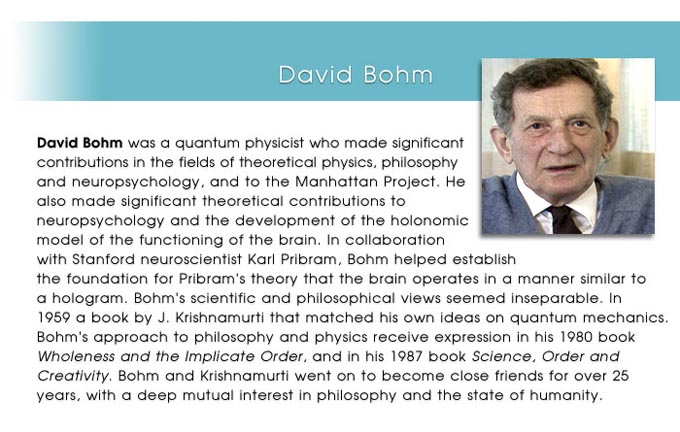
Interview
Limitations of Thought
Essay
Knowledge & Insight
We are faced with a breakdown of general social order and human values that threatens stability throughout the world. Existing knowledge cannot meet this challenge. Something much deeper is needed, a completely new approach. I am suggesting that the very means by which we try to solve our problems is the problem. The source of our problems is within the structure of thought itself. This may seem strange because our culture prides itself on thought being its highest achievement.
Almost everything we see in the world was created by thought, all the cities, the buildings, science, technology, and even most of what we call nature. Farmland was created by thought, so were factories, airplanes, nations and governments. Thought is very powerful, and has created many good things, but if we don’t notice how it works, it can become very destructive, as with the present danger of nuclear war, pollution and mass destruction of natural resources. Therefore, it is necessary to look at the structure of thought and knowledge, to see what the problems are and to explore the question of insight, which is required to bring knowledge to order.
We are all familiar with abstract knowledge stored in memory; in books, in records and computers, but knowledge goes further than this to include all sorts of skills. And there’s tacit knowledge, that is, without words. Another part of knowledge is belief. Beliefs motivate us and are based on presuppositions. Our whole approach to life is full of presuppositions. They affect everything, our actions, our thoughts, our feelings, our urges, desires, and motivations. Presuppositions have an unconscious yet pervasive effect on our whole being. We may have presuppositions of the inferiority of certain kinds of people, whatever they may be. We are very likely then to perceive and experience them as inferior and treat them accordingly.
This, of course, is prejudice or pre-judgment. It is a presupposition. Therefore, thought and knowledge are active. They are participatory and affect everything, the way we behave, the way we respond, perception, every part of our life.
I suggest that we don’t decide what to do with information. Information takes over. It runs us. Thought then creates the impression that it is our servant, just doing what we want it to do. That’s the difficulty.
Knowledge, as it actually exists, is an undivided whole. It’s in flowing movement, an ongoing process. But there is a tendency to say that only correct knowledge is active and incorrect knowledge is no knowledge at all. But at any moment knowledge is a mixture of what is correct and what is incorrect. Often you cannot tell the difference and treat them both the same.
We are saying that thought is not merely the intellectual activity. Every reaction to thought is simultaneously emotional, neurophysiolgical, chemical and everything else. And it passes between people – as one whole process all over the world. The point is, that memory is something you never see and in many ways has been interchanged with perception. The movement of the mind is far too subtle, complex and rapidly moving to be grasped by thought. So we are caught, responding from memory without knowing that this is actually happening. Our perceptions are shaped and colored by memory in ways that are not conscious. This evidently leads to irrelevant actions and ultimately to conflict.
Knowledge without insight will ultimately lead to self-deception because of the pressures implicit in that knowledge. There is little realization of the ultimate inability of science to avoid the self-deception implicit in the active functioning of knowledge which is not penetrated by insight.
Insight is universal, and its origin or essence is not restricted to great scientific discoveries or to artistic creations, but rather is of crucial significance to everything we do. The negative operation of insight removes blocks and barriers, while the positive is the new perception that this removal makes possible.
The key point is that everyone must be able to question with great energy and passion whatever is not clear. It’s necessary to sustain this questioning in spite of whatever difficulties may arise. This questioning is not an end in itself and its purpose is not mainly to give rise to answers. Rather, it’s essential in the whole movement of life which can only be harmonious when this ceaseless questioning frees the mind of the tendency to hold indefinitely to contradictory and confused knowledge. If you question in this way, there may be the energy of insight which is crucial for opening up the mind to new directions. To do this is a tremendous challenge, not only because of our habit of wanting important ideas to be secure, but because of very deep and subtle questions involving how the mind operates.
At present insight is not generally given great value in society or in education. Rather, there’s a very strong bias in favor of accumulating knowledge, and doing this far beyond the point where it actually makes sense, while the spirit of questioning, necessary for insight, is ignored and, in fact, is discouraged if this questioning disturbs strong beliefs.
There’s also a great deal of discussion for the need to foster creativity. When you look closely however, what is actually being done is often developing the imagination, which is not enough for creativity. Imagination may be part of creativity, but without insight, neither imagination nor reason nor anything else is going to be creative. We have to see is that insight itself has very high value. Then we’ll have a different attitude toward knowledge, values and education. The whole of life will be a field in which there is no end to the possibility of fresh and original perceptions.
Interview
Limitations of Thought
Essay
Knowledge & Insight
